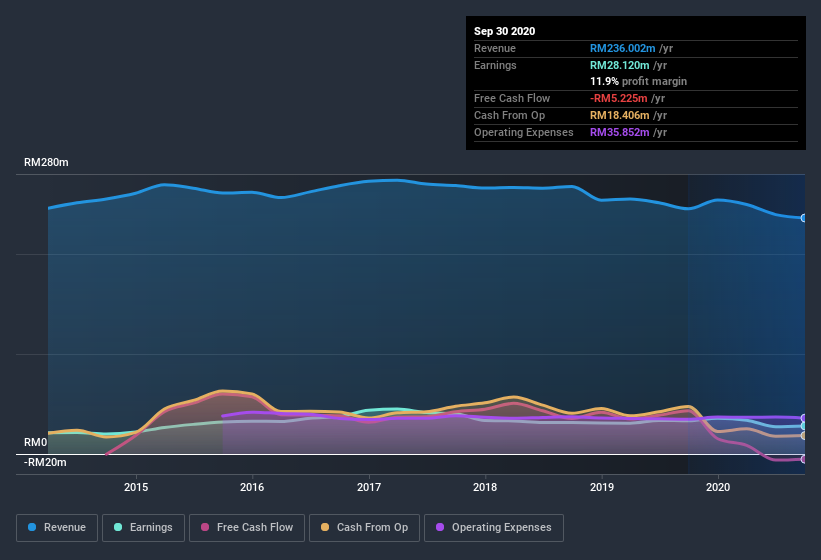Are Cocoaland Holdings Berhad's (KLSE:COCOLND) Statutory Earnings A Good Guide To Its Underlying Profitability?

Broadly speaking, profitable businesses are less risky than unprofitable ones. That said, the current statutory profit is not always a good guide to a company's underlying profitability. Today we'll focus on whether this year's statutory profits are a good guide to understanding Cocoaland Holdings Berhad (KLSE:COCOLND).
We like the fact that Cocoaland Holdings Berhad made a profit of RM28.1m on its revenue of RM236.0m, in the last year. Below, you can see that both its revenue and its profit have fallen over the last three years.
See our latest analysis for Cocoaland Holdings Berhad

Not all profits are equal, and we can learn more about the nature of a company's past profitability by diving deeper into the financial statements. As a result, we think it's well worth considering what Cocoaland Holdings Berhad's cashflow (when compared to its earnings) can tell us about the nature of its statutory profit. Note: we always recommend investors check balance sheet strength. Click here to be taken to our balance sheet analysis of Cocoaland Holdings Berhad.
A Closer Look At Cocoaland Holdings Berhad's Earnings
Many investors haven't heard of the accrual ratio from cashflow, but it is actually a useful measure of how well a company's profit is backed up by free cash flow (FCF) during a given period. The accrual ratio subtracts the FCF from the profit for a given period, and divides the result by the average operating assets of the company over that time. You could think of the accrual ratio from cashflow as the 'non-FCF profit ratio'.
Therefore, it's actually considered a good thing when a company has a negative accrual ratio, but a bad thing if its accrual ratio is positive. While it's not a problem to have a positive accrual ratio, indicating a certain level of non-cash profits, a high accrual ratio is arguably a bad thing, because it indicates paper profits are not matched by cash flow. That's because some academic studies have suggested that high accruals ratios tend to lead to lower profit or less profit growth.
For the year to September 2020, Cocoaland Holdings Berhad had an accrual ratio of 0.21. Unfortunately, that means its free cash flow fell significantly short of its reported profits. Even though it reported a profit of RM28.1m, a look at free cash flow indicates it actually burnt through RM5.2m in the last year. It's worth noting that Cocoaland Holdings Berhad generated positive FCF of RM43m a year ago, so at least they've done it in the past. The good news for shareholders is that Cocoaland Holdings Berhad's accrual ratio was much better last year, so this year's poor reading might simply be a case of a short term mismatch between profit and FCF. Shareholders should look for improved cashflow relative to profit in the current year, if that is indeed the case.
Our Take On Cocoaland Holdings Berhad's Profit Performance
Cocoaland Holdings Berhad's accrual ratio for the last twelve months signifies cash conversion is less than ideal, which is a negative when it comes to our view of its earnings. Because of this, we think that it may be that Cocoaland Holdings Berhad's statutory profits are better than its underlying earnings power. Sadly, its EPS was down over the last twelve months. At the end of the day, it's essential to consider more than just the factors above, if you want to understand the company properly. So if you'd like to dive deeper into this stock, it's crucial to consider any risks it's facing. Our analysis shows 4 warning signs for Cocoaland Holdings Berhad (2 are a bit unpleasant!) and we strongly recommend you look at these bad boys before investing.
Today we've zoomed in on a single data point to better understand the nature of Cocoaland Holdings Berhad's profit. But there are plenty of other ways to inform your opinion of a company. For example, many people consider a high return on equity as an indication of favorable business economics, while others like to 'follow the money' and search out stocks that insiders are buying. So you may wish to see this free collection of companies boasting high return on equity, or this list of stocks that insiders are buying.
When trading Cocoaland Holdings Berhad or any other investment, use the platform considered by many to be the Professional's Gateway to the Worlds Market, Interactive Brokers. You get the lowest-cost* trading on stocks, options, futures, forex, bonds and funds worldwide from a single integrated account. Promoted
New: AI Stock Screener & Alerts
Our new AI Stock Screener scans the market every day to uncover opportunities.
• Dividend Powerhouses (3%+ Yield)
• Undervalued Small Caps with Insider Buying
• High growth Tech and AI Companies
Or build your own from over 50 metrics.
This article by Simply Wall St is general in nature. It does not constitute a recommendation to buy or sell any stock, and does not take account of your objectives, or your financial situation. We aim to bring you long-term focused analysis driven by fundamental data. Note that our analysis may not factor in the latest price-sensitive company announcements or qualitative material. Simply Wall St has no position in any stocks mentioned.
*Interactive Brokers Rated Lowest Cost Broker by StockBrokers.com Annual Online Review 2020
Have feedback on this article? Concerned about the content? Get in touch with us directly. Alternatively, email editorial-team (at) simplywallst.com.
About KLSE:COCOLND
Cocoaland Holdings Berhad
Cocoaland Holdings Berhad, an investment holding company, manufactures and trades in processed and preserved foods and fruits in Malaysia, Eastern Asia, South East Asia, the Middle East, and internationally.
Flawless balance sheet with moderate growth potential.
Market Insights
Community Narratives



